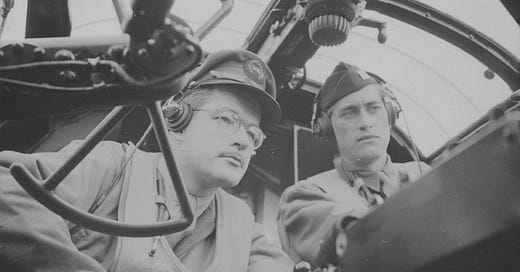Gladwin Hill made covering the war his mission
It may have been St. Catherine’s Day that pushed Gladwin Hill over the edge.
The Associated Press correspondent, put in charge of the wire service’s Paris bureau shortly after the city’s liberation on Aug. 25, 1944, soon found himself covering everything but the war. Exactly three months after Paris was freed, Hill was compelled to write about the traditional Parisian holiday festivities that featured women parading about in spectacular, custom-made hats.
Around this time, Hill said in an oral history recorded more than 40 years later, “I screamed at New York and said I wanted to get off of that sort of stuff and get back to being a war correspondent.”
It was what he had come to Europe to do, and he would leave the AP so he could do it again.
Gladwin Hill was born in Boston on June 16, 1914 and began writing for the Boston Evening Transcript during his freshman year at Harvard. His father had been a newspaperman before settling into a life in the financial sector, but Hill was fascinated by the craft from an early age.
After graduating from Harvard, he got a job with the Associated Press in New York thanks to a recommendation from his boss at the Transcript. The AP taught him the ropes as a reporter and an editor, and he soon became a roving feature writer, traveling the country to find stories.
He moved to the Los Angeles bureau in the months after the Pearl Harbor attacks when the AP put a greater focus on West Coast coverage, but wanted to cover the fighting firsthand. He arrived in England in September 1942 to replace Drew Middleton, who had jumped from the AP to the New York Times.
After settling in, he found a niche covering the only Americans actively fighting Germany: the Eighth Air Force. He was part of a small group of correspondents focused on the air war, which included his rival Walter Cronkite of United Press and Sgt. Andy Rooney of Stars and Stripes.
Their work consisted largely of driving out to airfields and being briefed on the day’s missions, interviewing some crew members, and returning to London. After months of agitating to be allowed to actually accompany bombing missions, a core group of correspondents went through a crash course in aviation crew training and was cleared to join a mission.
Dubbed “The Writing 69th,” the correspondents finally got their chance on Feb. 26, 1943, with six of them slated to accompany a raid on Wilhelmshaven. Hill’s story from that mission made clear the respect he had for the men flying into danger multiple times per week, calling it an honor to ride along with them.
Hill would maintain that niche for much of the war in Europe. On D-Day, he flew over the Normandy coast before dawn on a B-26, returning to England to pound out an eyewitness story of what he had seen from above that was on the wires quickly enough to be used in evening newspapers back home.
Over the shore I saw the tremendous naval and shore engagement developing, and a few miles inland I could see fields strewn with hundreds of parachutes, where the Allied forces had dropped. The fields were dotted, too, with aircraft — probably gliders — bearing the distinctive Allied invasion blue-and-white zebra stripe which hurriedly was slapped on all aircraft yesterday.
In the channel, on every hand, there were great forces of ships, battering the coast or bringing up reinforcements to support the initial invasion thrust.
He continued to work out of England before heading to Paris immediately after liberation to begin his work there. As the end of 1944 neared, he became so frustrated with the AP’s refusal to let him return to covering the war that he went to speak with the New York Times while on a brief furlough home and ended up making the jump.
His first Times byline appeared in mid-February 1945, and he would spend his first few weeks back covering the bomber boys. Finally, in early March, he began covering the fighting on the continent, filing his first story from inside Germany.
His first major story was a survey of Cologne, where he made clear the staggering destruction wrought by the bombers he had spent years chronicling. “The devastation made London’s bomb damage look like a drop in the bucket by comparison,” he wrote.
From there, he covered the surprise crossing of the Rhine at Remagen, sharing a jeep with his old pal Rooney on a grueling 17 1/2 hour saga to get the story and get back to actually file it.
Hill returned to his old base in Paris as the end of the fighting in Europe neared and would see out the war from the press headquarters at the Hotel Scribe. He moved on to report from Germany beginning in July 1945 and eventually spent weeks in Poland, where the foundations of the Cold War were settling into place.
He headed back to the U.S. for good early in 1946 and asked to return to Los Angeles, where he would remain the rest of his life. Hill continued to write for the Times, eventually becoming the nation’s first reporter covering environmental issues full-time.
Hill retired from the Times in 1979 and died of lung cancer in 1992. He was 78 years old.




